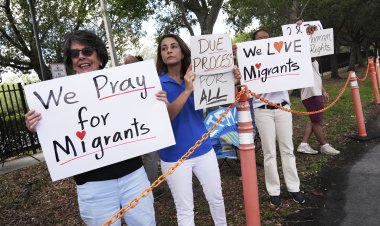U.S. charges more than a dozen people in China espionage cases
Attorney General Merrick Garland said the new actions would “disrupt criminal activity” of individuals working on behalf of China.

The Biden administration is intensifying its efforts to put the spotlight on alleged covert operations by the Chinese government in the United States, unveiling a trio of criminal cases on Monday that included one in which Chinese operatives were accused of attempting to pay bribes for inside information about the high-profile prosecution of Chinese telecommunications giant Huawei.
Two Chinese citizens, Guochun He and Zheng Wang, were charged in a criminal complaint in federal court in New York with obstruction of justice after allegedly offering bribes to an unidentified U.S. government employee for details about an ongoing criminal investigation. The complaint says the U.S. employee worked with the FBI to arrange a sting operation aimed at the two defendants, who the FBI alleges are Chinese intelligence officers, offering them fake information about the case marked “Secret.” Court filings in the new case don’t directly name Huawei, but details in the complaint indicate the unnamed company is the Chinese tech firm repeatedly accused by U.S. policymakers of ties to Chinese intelligence.
“This was an egregious attempt by PRC intelligence officers to shield a PRC-based company from accountability and to undermine the integrity of our judicial system,” Attorney General Merrick Garland, using the initials for the People’s Republic of China, declared at a news conference on Monday that included an unusually large complement of Justice Department leadership.
In separate cases, seven Chinese citizens were charged with participating in a scheme to force a Chinese-born U.S. resident living in New York to return to China. Four Chinese nationals have been charged in the District of New Jersey with conspiring to act as illegal agents on behalf of China by using a “purported” academic center in that country to seek sensitive information from U.S. academic institutions.
Only two of the 13 people charged in the newly announced criminal cases have been arrested, according to the Justice Department. Many or all of the rest appear to be overseas and may never see the inside of a U.S. courtroom.
Garland said the series of cases fit a pattern on the part of the Chinese government of trying to undermine U.S. institutions and exert influence against Chinese government critics abroad.
“As these cases demonstrate, the government of China sought to interfere with the rights and freedoms of individuals in the United States and to undermine our judicial system that protects those rights. They did not succeed,” Garland said.
Deputy Attorney General Lisa Monaco offered particular praise for the unidentified U.S. government employee who spent at least four years as a “double agent,” stringing along the alleged Chinese government representatives at the behest of the FBI.
“The insider flipped the script on the defendants by working, not for them, but for Team America,” Monaco said.
During his comments to reporters, FBI Director Christopher Wray stressed at least three times that he had long been sounding the alarm about an onslaught of what U.S. officials call “malign” Chinese government efforts in the West, including efforts to steal intellectual property and to intimidate perceived opponents of the Chinese government and Chinese Communist Party rule.
“This is something that I’ve been talking about for years now,” Wray said on Monday. “Each of these cases lays bare the Chinese government’s flagrant violation of international laws, as they work to project their authoritarian view around the world, including within our own borders.”
The FBI chief said one clear sign of the connection between some of the defendants and the Chinese government was that they gave the target of one alleged intimidation campaign a deadline to return to China before the Chinese Communist Party congress that took place earlier this month.
Wray seemed to relish pointing out what he called “hypocrisy” in Chinese government rhetoric.
“While the CCP claims to stand for sovereignty and non-interference in other states’ affairs, what the Chinese government actually does is interfere with sovereign governments around the world, whenever doing so suits Beijing,” the FBI director told journalists gathered along with dozens of agents and public information officials in a conference room at Justice Department headquarters in Washington.
Spokespeople for Huawei, which has pleaded not guilty to criminal charges in U.S. courts, did not respond to requests for comment.
A spokesperson for the Chinese Embassy in Washington did not immediately respond to a request for comment. However, when the Justice Department unveiled similar charges in March, Chinese officials issued indignant denials.
“China always asks Chinese citizens to abide by laws and regulations in host countries,” Chinese Foreign Ministry spokesperson Zhao Lijian said then. “We have never asked and will never ask Chinese citizens to do things in violation of local laws and regulations. The accusation of ‘transnational repression schemes’ is totally made out of thin air. The U.S. attempt to hype up ‘China threat’ and tarnish China’s reputation is doomed to fail.”
The new charges announced on Monday drew the attention of some U.S. lawmakers, who suggested the new prosecutions were more evidence of the dangers of Chinese government and corporate influence.
“Huawei isn’t a private company — Huawei is a key piece of the Chinese Communist Party’s techno-authoritarianism,” Sen. Ben Sasse (R-Neb.) said in a statement. “The United States cannot ignore the threat the CCP poses to human dignity around the world. We need far more American intelligence and law enforcement focus on the CCP’s strategy to use front organizations and fake ‘private sector’ companies to try to bribe, compromise, and silence Americans.”
“The charges announced today by the Department of Justice further illustrate Huawei’s inextricable ties to the Chinese Communist Party (CCP) and its brazen but unsurprising disregard for the rule of law,” Sen. Mark Warner (D-Va.), chair of the Senate Intelligence Committee, said in a statement. “The Intelligence Community has repeatedly warned about the economic and national security threats posed by Chinese telecommunications companies like Huawei, which are backed by the CCP and exploited in the interest of authoritarian goals and ambitions. I applaud the dedicated work of the Department of Justice and law enforcement officials, and I look forward to seeing any investigations against Huawei proceed unimpeded.”
During visits to Capitol Hill, Wray has faced questions over a perceived disconnect between his grave public warnings about China and the Justice Department’s decision in February to drop a China-focused enforcement effort launched during the Trump Administration: the China Initiative. Department officials jettisoned the project, at least in name, after it became the focus of criticism from Asian American civil rights groups that said it encouraged unwarranted suspicion of people of Chinese origin.
Asked on Monday whether the move to disband the China Initiative was a mistake in light of the flurry of new charges, Assistant Attorney General for National Security Matthew Olsen — the official who announced the termination of the initiative — insisted that the new cases demonstrated that federal prosecutors remain focused on the threat they see from China.
“We have stayed very focused on the threat that the PRC poses to our values, to our institutions,” Olsen said. “What we are charging today in terms of the range and persistence of the threat we see from the PRC demonstrates that we have remained relentless and focused on that threat and we will continue to be focused on that threat going forward.”
Maggie Miller contributed to this report.












